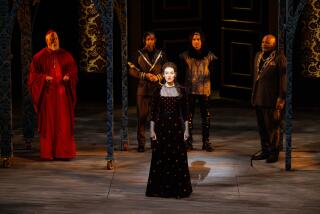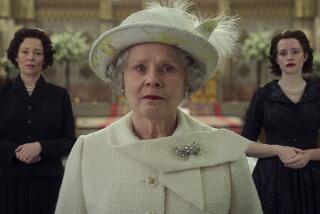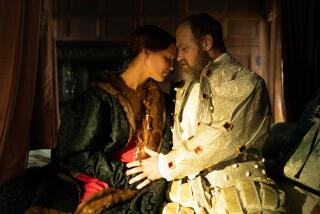Review: ‘The Hollow Crown’ on PBS a princely Shakespearean treasure
“The Hollow Crown,” which begins Friday on PBS under the venerable standard of its “Great Performances,” comprises four Shakespeare plays, often called the Henriad as there is a King Henry (Henry IV, then Henry V) in each of them.
It’s too much to say that this is what television was made for — since it was also made for professional wrestling and situation comedies — but it is part of its original promise and compact, that ennobling great works of art (ennobling in their greatness, that is, not in any didactic way) be made available to all, in the comfort of our own homes. If you are open to them, these plays can actually make you a better person, in a way that most TV will not.
For all that they come from a different world, with different rules, these plays are not only psychologically modern but dramatically sound. Whatever specific meanings they may have had for their time, they are works of such genius and depth — they go all the way to the bottom of things — as to also be out of time. The questions they address are undying; they’ll mean as much 400 years from now, and 400 years from 400 years now, as they did 400 years ago, and do now.
PHOTOS: Shakespeare 2.0: The bard on the screen
“Richard II,” with Ben Whishaw as the king that the future Henry IV (Rory Kinnear) will depose, begins the cycle. Director Rupert Goold has said that he’d been thinking of Richard as a kind of Michael Jackson figure, airy and ambiguous and not quite of this Earth — and he gives him a monkey.
Though shot like the other plays here on location, it has a measured formality and heightened visual style that mirrors both Shakespeare’s language and Richard’s medieval view of his divine rights and majestical person. (So stately is Goold’s pacing that the first 20 minutes of the film might be played on the stage in five.)
Goold also makes the Christian metaphors of Richard’s royal martyrdom visually explicit — indeed, Whishaw resembles less the historical figure than he does Jesus, as we tend to picture him — with a St. Sebastian reference thrown in for good measure. And he fills the screen with images of nature that both celebrate the land and underscore that good kings and bad are only men in a mortal world.
PHOTOS: Hollywood Backlot moments
Richard Eyre directed the two films that make up “Henry IV, Parts 1 and 2,” across whose course a boy becomes a man and grown men grow old. The tone here is more naturalistic and hectic, with Jeremy Irons’ king contending with the civil wars and rebellions prophesied at the end of “Richard II” and bemoaning the antics of his son Hal (Tom Hiddleston), who unlike his friends’ more responsible sons is off carousing with Sir John Falstaff (Simon Russell Beale, heartbreaking), a fat, old, drunk knight who is the center of action down at the Boar’s Head Tavern. Thea Sharrock’s “Henry V” is the most movie-like in some respects — the music more aggressive, the action more muscular; yet she too scales it toward the human, and I like it better than the Laurence Olivier and Kenneth Branagh films that helped make this the most familiar of the plays presented here. The famous speech that precedes the Battle of Agincourt is delivered quietly, by the king to his commanders, and in its aftermath, there is no exultation but only a kind of dazed taking stock.
Of the large supporting cast, American viewers will know many from television; many, of course, are grounded in this stuff. David Suchet, David Morrissey, Patrick Stewart, James Purefoy, Julie Walters, the late Richard Griffiths, John Hurt, Geraldine Chaplin and Michelle Dockery are among the names better known here, though many more faces will be familiar.
The performances are so wonderful it feels wrong to single any out. But Whishaw finds great power in stillness; Hiddleston fits himself admirably to his character’s stages and turns of mind, resolving his coldness with his warmth, his cruelty with his generosity. And there is Beale’s Falstaff — marvelously poignant, a scoundrel-hero, getting everything wrong. His sorrow at losing the transformed Hal is as tragic a moment as any here, his fall no less thunderous than Richard’s.
----------------------------------
‘The Hollow Crown’
Where: KOCE
When: “Richard II,” 9 p.m. Friday; “Henry IV, Part 1,” 9 p.m. Sept. 27; “Henry IV, Part 2,” 9 p.m. Oct. 4; “Henry V,” 9 p.m. Oct. 11
Rating: TV-14-V (may be unsuitable for children under the age of 14, with an advisory for violence)
More to Read
The complete guide to home viewing
Get Screen Gab for everything about the TV shows and streaming movies everyone’s talking about.
You may occasionally receive promotional content from the Los Angeles Times.







